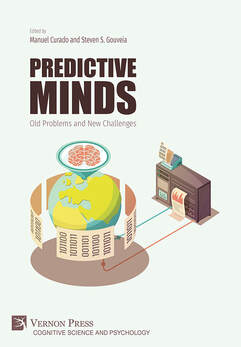- [ENG]
Year: (2023)
Publisher: Vernon Press
Editor: Steven S. Gouveia & Manuel Curado
Pages: 305
Description: The Predictive Processing Theory of Mind is a recent theory developed by philosophers, cognitive scientists, and neuroscientists about the nature and function of the brain and its role in creating the conscious mind that we humans, and perhaps some non-human animals, have. The authors that advanced those lines of research believe that there is a fundamental idea that has been overlooked in the research done about the brain until the present: that the brain is a prediction machine with the function of creating hypotheses about the causes of our sensory signals and predictions of possible future sensory signals. Moreover, the internal models of the world created this way are constantly challenged by incorporating the errors of the previous models into new models. From this point of view, the brain's work could be described as a process of making predictions about the upcoming sensory data based on its best current models of the causes of those data.
This book intends to critically analyze this theory and its subsequent theoretical and empirical consequences. To achieve that, the volume brings together some of the best experts on Predictive Processing – such as Thomas Metzinger, Wanja Wiese, or Mark Miller – with the goal of presenting some of the advantages of this approach but also some of its caveats.
Praise:
"In this collection of essays, Curado and Gouveia have captured an illuminating snapshot into the contemporary debate on the philosophy of predictive processing. The authors draw on a cast of insightful thinkers, philosophers, and scientists—supported by illustrative visual aids and illusions—to develop a diverse range of modern perspectives. In addition to a highly accessible introduction to predictive processing, this book contains invaluable aids to navigating between realist, representationalist, and constructivist approaches to cognitive science. In short, this book offers a valuable opportunity for neuroscientists, psychologists, and philosophers to challenge (and perhaps update) their prior beliefs."
Dr. Thomas Parr, Department of Imaging Neuroscience. University College London.
Table of Content:
- "Introduction" by Steven S. Gouveia & Manuel Curado;
- Chapter 1 "Key Concepts of Predictive Processing" by Wanja Wiese (Ruhr-Universität Bochum) & Thomas Metzinger (Johannes Gutenberg-Universität Mainz);
- Chapter 2 "Predictive Processing and Metaphysics" by Arthur Schwaninger (University of Zurich);
- Chapter 3 "Taking-off from Primary Impressions: An Essay about the Metaphysical Constraints of Predictive Processing" by Manuel Curado (University of Minho);
- Chapter 4 "Predictive Mind, Surprise and the Layers of the Emotional Landscape" by Dina Mendonça (NOVA University of Lisbon);
- Chapter 5 "Regulation, not Perception: Emotion and Predictive Machinery" by José M. Araya (Universidad de Talca);
- Chapter 6 "Interoceptive Inference: Emotion-Cognition Interactions in the Predictive Brain" by Mark Miller (Monash Monash University) & Jelena Markovic (University of Toronto);
- Chapter 7 "Predictive Processing and Delusions" by Jorge Gonçalves (Nova University of Lisbon);
- Chapter 8 "The Predictive Core-Self and Body Illusions" by João Fonseca (NOVA University of Lisbon);
- Chapter 9 "Heads, I Win – Tails, You Lose: Gambling from Predictive Processing Perspective" by Valtteri Arstila, Jarno Tuominen and Susanne Uusitalo (University of Turku);
- Chapter 10 "Ecological in Spirit? Predictive Processing and the Limits of Direct Perception" by Matthew Sims (Ruhr University Bochum);
- Chapter 11 "Predictive Processing as a Computational Mechanism" by Jona Förster (Freie Universität Berlin);
- Chapter 12 "Method to Study Sets of Real Numbers, Infinities, and Infinitesimals" by Miguel Pais-Vieira (University of Aveiro), Manuel Curado & Nicolás Lori (University of Minho);
Pre-Order:
- Hardback (87€): here

